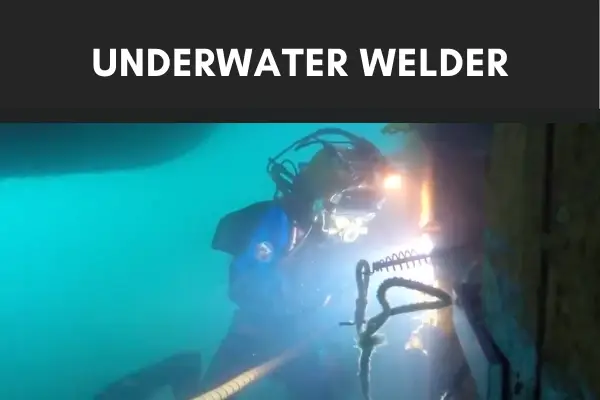The world of underwater welding has long been as impressive as it is mysterious. These talented individuals can perform their trade under excessive amounts of pressure – quite literally – navigating dangerous situations while fixing the seemingly unfixable.
Becoming an underwater welder takes time and dedication, as they need to be certified divers and have underwater welding training. Once these professionals complete their certification programs, they can seek employment on offshore oil rigs, ships, nuclear power plants, and more.
This article will dive into an underwater welder’s:
- Job description
- Training & requirements
- Certification & licensing
- Salaries
- Job prospects
Underwater Welder Job Description
Underwater welders can repair, draft, fit, rig, cut, and inspect underwater equipment and structures. They can work in lakes, rivers, oceans, reservoirs, and other bodies of water.
Working under elevated pressures underwater is also called hyperbaric welding. There are two forms of hyperbaric welding: wet welding and dry welding.
Wet welding is done directly in the water with a specially designed welding rod. This rod uses 300-400 amps of power, forming a gas bubble around the molten metal and allowing for welding to occur.
Dry welding is still done underwater but within a chamber. This chamber is filled with a gas mixture that surrounds the structure being welded.
Underwater Welding Job Training & Requirements
Underwater welders need to dominate not only basic welding techniques but safety strategies and underwater work skills for the field.
You’ll need both welding and diving certifications, with additional certificates available to help you stand out among the crowd in the job market.
To become an underwater welder, you’ll need to:
- Complete high school or a GED program
- Get your AWS welder’s certification
- Comply with state and local licensing requirements
- Become a commercially certified scuba diver
- Consider additional certification
- Complete High School
Underwater welders need to first complete high school or a GED program. They should be 18 years or older.
- Become an AWS-Certified Welder
To learn the welding basics, you may opt to get your AWS Certified Welder’s certificate from the American Welding Society (AWS). The AWS is nationally recognized as the leading education and certification provider for welders in the U.S.
The AWS Certified Welder Program has no prerequisites. You will learn about working with petroleum pipelines, sheet metal, structural steel, and chemical refineries.
Once you’ve gone through the program, you’ll have to complete a final exam at an AWS accredited testing facility.
Alternatively, you could complete a welding program at a trade school or community college. Many of these programs are accredited by the AWS to give the final exam, which means you can still become AWS-certified in addition to receiving your program’s certificate.
For more information on testing and AWS requirements, see here.
- Get a Local Welding License
Your state may have additional licensing requirements for welders – underwater or not – so be sure to check local regulations. Requirements might include local testing for a welder’s license, registering with your municipality, or state-wide licensing procedures.
- Get Your Commercial Diver’s Certificate
Once you know your welding basics, you’ll need to become a commercially certified diver. A basic-level commercial diver program lasts roughly two months, although programs vary.
Technical programs specializing in underwater welding will be longer. During the course, you’ll learn and understand the theory before having hands-on training in your program.
For a list of underwater welding schools, in particular, see here.
To become a commercial diver, you must be physically fit and able to swim at least 400 meters without assistance. You must also undergo a physical either before or after your certification.
This type of certification could cost you around $8,000 total, although some schools can be much more expensive depending on the coursework.
You should choose a program and diving school that meets the standards of the country where you’d like to work.
For U.S.-based divers, it’s recommended, but not required, to choose a school that meets the standards of the Association of Commercial Diving Educators (ACDE). The ACDE was created in 1979 to connect and communicate between schools/programs and the commercial diving industry.
- Consider Additional Certifications
Learning how to dive commercially and weld are the basics for this career, but there are additional certifications that can add to your expertise and earning potential.
Consider completing additional certifications – especially those for diving – by reputable names like PADI or SDI.
Salary Range
The salary of an underwater welder can vary drastically depending on where they work and how much experience they have.
The average salary for commercial divers in the U.S. is $39.43 per hour or $82,010 per year. The lowest earners make only $37,120 per year and the highest earners make over $160,000. These statistics include all commercial divers – not just welders.
Generally, those working inland in rivers, on damns, and in lakes, make less than their ocean-side counterparts.
Inland underwater welders earn an average between $42,000-$53,000 annually. Again, this depends on your employer and work conditions.
Those on oil rigs or out at sea can see incomes near or in the 6-figures. You may be required to be away from home for long periods or work in more turbulent conditions. A general average salary here is $84,000 per year.
The first few years of underwater welding are the most tolling. You’ll want to accumulate as much experience as possible, which may mean starting out at a lower pay grade. After about 3-5 years, underwater welders see a significant bump in their salaries.
Underwater Welder Job Prospects
Underwater welders are considered commercial divers by the Bureau of Labor Statistics (BLS) of the U.S. As per the BLS, roughly 2,670 commercial divers are working in the U.S.
Top Industries for Underwater Welders
The industries that hire the most commercial divers are:
- Support services
- Heavy and civil engineering construction
- Architectural, engineering, and related services
States with the Most Commercial Divers
The states with the highest employment of commercial divers are:
- Florida
- Louisiana
- Washington
- New Jersey
- Virginia
- Vermont
- New Hampshire
The Best-Paying States for Underwater Welders
The highest-paying states for commercial divers are:
- California
- Washington
- New Jersey
- Alaska
- New Hampshire
To read this article in Spanish, click here.

